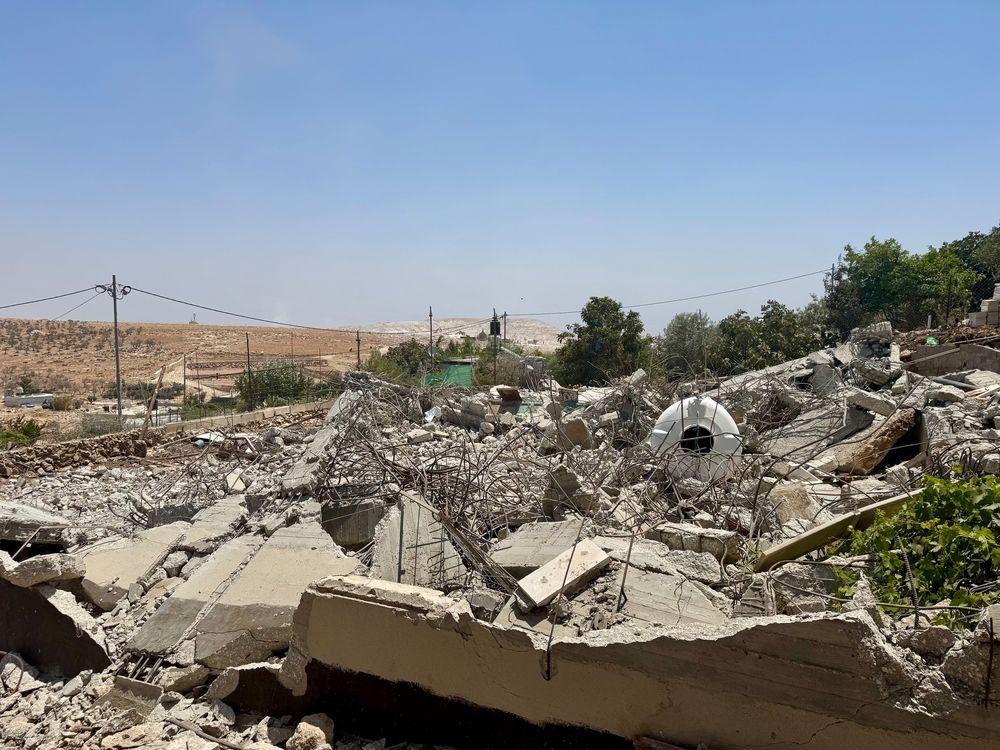Médecins Sans Frontières (MSF) addresses the urgent need for psychological assistance among people affected by the war across various regions of Ukraine, focusing particularly on the most vulnerable groups: those still living near the frontline; individuals who are directly exposed to the war, such as the severely wounded and their family members as well as internally displaced people (IDPs; and people who have lost their families or loved ones.
In Vinnytsia, central Ukraine, MSF runs a psychological support centre dedicated to treating traumatic stress. At the centre, doctors, psychiatrist, psychologists, and health promoters work with people suffering from post-traumatic stress disorder (PTSD) linked to the war. To support recovery, the team provides both individual therapy sessions and group creative classes. The MSF team has seen a rise in the number of people seeking help for mental trauma in 2025.
I feel like I'm constantly living out of a suitcase.
Danylo Fostii, age 7
Fostil was forced to flee Kramatorsk (Donetsk region) with his 48-year-old mother Alisa when the war intensified in 2022. Now settled in a temporary apartment in Vinnytsia, where he is enrolled in school, Danylo speaks of “always living out of suitcases,” the lack of a space of his own, and the absence of his father who remained in Kramatorsk. Alisa reports that she has observed in her son a deep sense of inferiority and signs of aggression.
For this reason, they now both attend weekly psychological support sessions at the MSF centre in Vinnytsia—appointments that Danylo eagerly anticipates each Thursday, during which he expresses his emotions through drawing and games focused on identifying feelings, especially joy, his favourite emotion. Alisa, meanwhile, suffers from chronic anxiety and panic attacks for which she has taken antidepressants; she receives ongoing psychological care from the MSF teams, whom she describes as compassionate and professional. In parallel, Danylo continues his extracurricular activities: he practices mental arithmetic (Soroban), which he hopes to teach in the future, plays in a chess club, and trains in taekwondo.
In addition, MSF teams provide evidence-based treatments for war veterans, wounded or demobilized and back to civilian life, relatives and families, as well as for displaced people affected by the ongoing war. The center utilizes therapies such as Eye Movement Desensitization and Reprocessing (EMDR) to help patients process traumatic memories and alleviate symptoms of PTSD.
This last war brought back everything — old memories, old wounds.
Oleksii Lohanov, aged 57
Lohanov was a veteran of several wars - from the Soviet-Afghan conflict in the 1980s to the current war. According to the psychotherapist who has been treating him for 6 months, Oleksii suffers from complex post-traumatic stress disorder. The current war has rekindled old traumas, particularly those linked to the war in Afghanistan 40 years ago, which he had never spoken about before.
When he arrived at the MSF centre in Vinnytsia, Oleksii had motor problems, severe fluency, heart problems and disturbed sleep. After 37 therapy sessions, his psychological state has stabilised considerably, even though the physical consequences are irreversible. It was necessary to work on all these layers of traumatic memories in order to stabilise Oleksii, using various techniques: EMDR, brainspotting, gestalt therapy, sensorimotor therapy and narrative therapy.
“The number of patients receiving active treatment for PTSD at our centre each month increased from 57 in January 2024 to 118 by the end of April 2025,” says Christine Mwongera, MSF medical coordinator. “We are witnessing a considerable need for mental health support, particularly among men in Ukraine. The proportion of male patients among newly admitted individuals has grown. Many are veterans — people who lived and worked in conflict areas and now face challenges adapting to a relatively safer environment and rebuilding social connections. We also observe that many patients require systematic, long-term treatment.”
Many men, in particular, feel stigmatised and are reluctant to seek help. Stigma surrounding mental health remains a significant barrier to care in Ukraine — especially for men — and is rooted in long-standing cultural and historical attitudes. It can be particularly difficult for loved ones to support those trying to adapt socially after returning from war-affected areas. Often, people suffering from PTSD believe they can manage on their own, without medical help. This often-invisible illness can severely reduce quality of life and increase risky behavior, turning daily routines into a cycle of trauma, isolation, and physical exhaustion, worsening chronic health conditions.
“I was sitting across from the therapist, and when he asked what was bothering me, I answered honestly: everything, including him,” says 27-year-old war veteran Oleksandr Zelenii. Seriously injured during a double explosion in Luhansk region, he now lives with a traumatic brain injury, sleep disorders, memory loss, and symptoms of PTSD including irritability, lack of motivation, and difficulty with social interactions. “After years of rehabilitation and consistent MSF psychological support, I feel more balanced and calmer. I’ve even applied for a new job, where I can work as a peer supporter — because I believe I’m ready to share my experience and help others on their recovery journey.”
Since the beginning of the full-scale invasion of Ukraine, MSF has adapted its activities to respond to the new challenges of the war. The main areas of work in 2025 include an MSF ambulance service to transport people with serious injuries from frontline to safer areas; mobile clinics providing medical consultations necessary medicines to people living in frontline areas; early rehabilitation for seriously injured patients in Cherkasy region; PTSD treatment of and psychological assistance in the Vinnytsia region; and donations of medicines. In addition, our teams run mobile clinics in towns and villages in the Kherson, Donetsk, Mykolaiv, Dnipropetrovsk and Kharkiv regions. We provide primary healthcare, mental health counseling and psychoeducational services, as well as sexual and reproductive healthcare.



